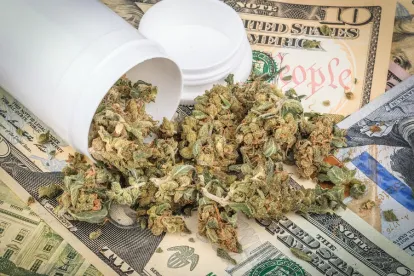We regularly blog about the conflict between state and federal law related to cannabis and the uncertainty regarding how federal criminal and Bank Secrecy Act (“BSA”) law will, or will not, be enforced against financial institutions providing banking services to marijuana-related businesses (“MRBs”). Because of this continuing uncertainty, many MRBs must operate on a cash-only basis. This creates significant safety and security concerns for both the MRBs and the communities in which they operate, causes regulatory and tax compliance challenges, and handicaps business growth.
This post provides an update on very recent efforts to provide a level of federal protection to financial institutions which provide banking services to MRBs. First, the Senate Banking Committee held a hearing regarding challenges faced by financial institutions and businesses in the cannabis sector. Second, the National Credit Union Administration (“NCUA”) issued guidance regarding servicing hemp producers and the cannabis industry. This NCUA guidance came quickly on the heels of a statement by the chairman of the NCUA that his agency won’t sanction federally-chartered credit unions for working with state-legal MRBs.
The Senate Committee on Banking, Housing, and Urban Affairs Hearing
We previously have blogged about some of the proposed MRB banking reform efforts from lawmakers. One of the most promising proposals, the Secure and Fair Enforcement Banking Act of 2019 (“SAFE Banking Act”), continues to build bipartisan momentum in the House. The SAFE Banking Act would provide a safe harbor barring federal law enforcement and regulatory agencies from punishing financial institutions that serve state-authorized MRBs.
On July 23, the SAFE Banking Act’s companion bill in the senate was discussed in a Senate Banking, Housing, and Urban Affairs Committee hearing. This “Challenges for Cannabis and Banking: Outside Perspectives” hearing may evidence a change in position for chairman Mike Crapo (R-ID) who has been resistant to discussions of allowing the financial industry to service the cannabis industry. At the hearing Crapo stated that:
Having a conversation about whether banks should be able to provide banking services to entities engaged in federal illegal behavior brings up the issue and concern that there has been a push to choke-off legal industries from the banking sector. . . . Operation Choke Point was deeply concerning because law-abiding businesses were targeted strictly for operating in an industry that some in the government disfavored. Under fear of retribution, many banks have stopped providing financial services to members of these lawful industries for no reason other than political pressure, which takes the guise of regulatory and enforcement scrutiny. Operation Choke Point was inappropriate and Congress needs to pass legislation to prevent future Operation Choke Point initiatives.
Ranking Member Sherrod Brown (D-OH) stated in his opening remarks that “we can’t continue to ignore this industry and the thousands of workers and communities it affects.” Brown commented that access to financial services is “just one piece of the conversation Congress must have on marijuana policy” and noted the significant consequences people face from criminal records over non-violent marijuana offenses and concerns over access to cannabis for medical needs. Jeff Merkley (D-OR), co-sponsor of the Senate bill, testified about the SAFE Banking Act proposal and advocated for lawmakers to take action.
Whether the SAFE Banking Act will be passed into law, or whether other reform efforts aimed at declassifying marijuana as a Schedule I controlled substance will move forward, of course ultimately remains uncertain. However, MRBs also can look to the easing of regulatory pressure in regards to credit unions.
Guidance from the National Credit Union Administration
Credit unions generally have been more willing to provide services to the cannabis industry. Two recent statements from the NCUA provides some reassurance to credit unions doing business with MRBs and hemp-related businesses.
First, on August 5, Rodney Hood, the chairman of the NCUA stated that his agency won’t sanction federally-chartered credit unions for working with state-legal MRBs. Hood stated that credit unions servicing MRBs still must comply with the BSA and their anti-money laundering (“AML”) obligations including following FinCEN rules and filing appropriate Suspicious Activity Reports (“SARs”). Hood’s statements recognize that financial institutions’ primary concern is often scrutiny from their regulators, as opposed to law enforcement, and may provide some peace of mind to credit unions who would like to provide services to MRBs.
However, such peace of mind may be temporary because a new chairman could reverse Hood’s policy. Additionally, credit unions that choose to engage in business with MRBs may still charge MRBs higher prices because of the significant monitoring obligations and SAR filings which FinCEN requires for MRBs. As always, a key issue for credit unions and other financial institutions doing business with MRBs is attempting to verify that the MRBs are indeed fully compliant with state law.
Second, on August 19, the NCUA issued interim guidelines stating that credit unions are permitted to service lawful hemp-related businesses. The 2018 Farm Bill legalized hemp at the federal level by removing it and its derivatives from the Schedule I of the Controlled Substances Act. However, the U.S. Department of Agriculture has yet to pass comprehensive regulations of hemp production. Consequently, hemp may not be lawfully produced under federal law unless it is produced under the 2014 pilot program. Therefore, much of the regulation and licensing of hemp-related businesses vary based upon state and tribal law.
Hood stated that “[l]awful hemp businesses provide exciting new opportunities for rural communities.” The NCUA guidance clarifies that credit unions “may provide the customary range of financial services for business accounts, including loans, to lawfully operating hemp related businesses within their fields of membership.”
NCUA highlighted the needs for credit unions to maintain appropriate monitoring, follow their BSA/AML procedures, and file appropriate SARs for suspicious or potentially illegal activity. NCUA clarified that it does not believe that credit unions are required to file SAR for hemp-related businesses operating lawfully, absent evidence of suspicious activity. However, credit unions must conduct appropriate due diligence, including knowing the state and tribal laws and regulations applicable to their hemp-related business customers. NCUA indicated that it will issue additional guidance once the USDA finalizes and issues its forthcoming regulations and guidelines for the hemp industry expected before the 2020 planting season.
Finally, our related podcast on financial services and the cannabis industry more generally reviews the many recent developments in this area, including state approaches to banking services, the status of hemp legalization, the interplay between federal and state cannabis law, FinCEN guidance on BSA expectations, and the status of federal regulatory and enforcement activity.



 />i
/>i

